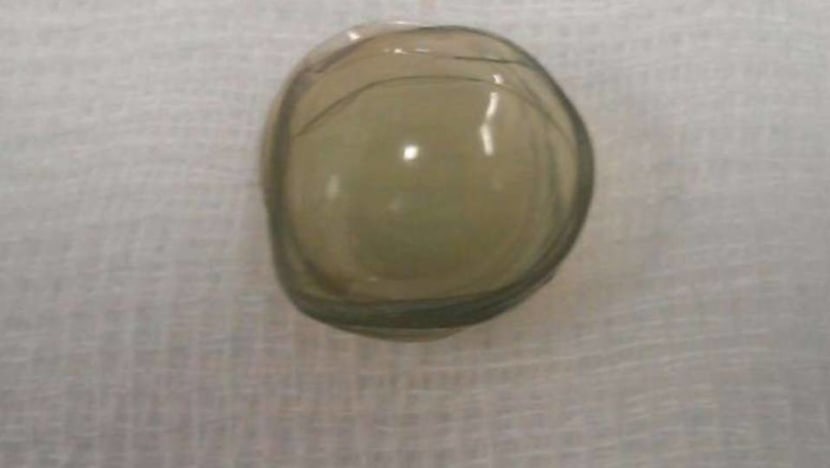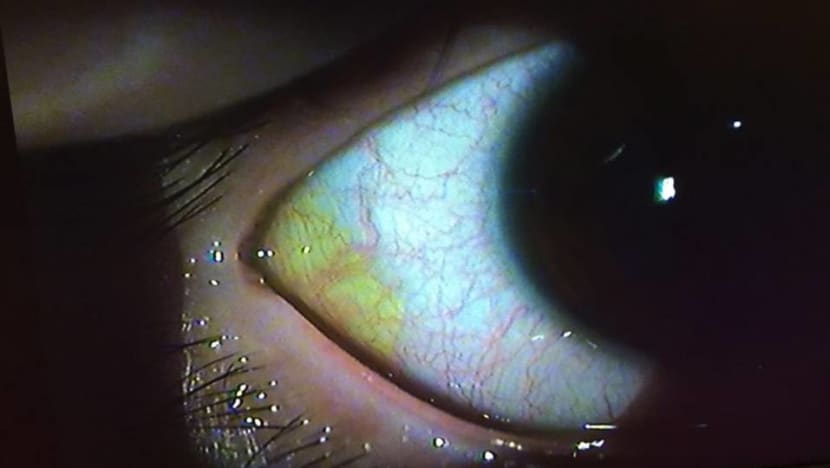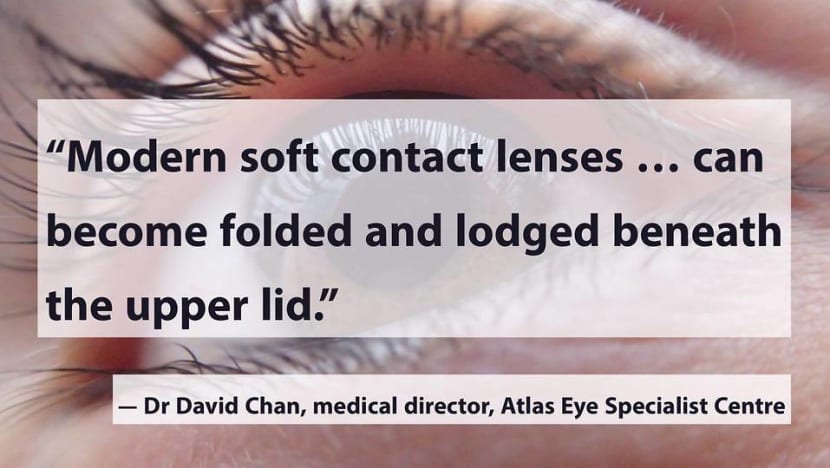Cases of contact lenses stuck in eyes not that uncommon in Singapore, specialists say

The woman had been due to have cataract surgery, but it was postponed after the discovery. (Photo: British Medical Journal)
SINGAPORE: Having multiple contact lenses lodged in your eye may be unusual, but losing one lens, or part of it, is not that uncommon, eye specialists here said.
A British woman was found with 27 contact lenses in one eye, 17 of which were found as a "blueish mass", bound by mucus. The woman had been due to have cataract surgery, but it was postponed after the discovery.

While the scale of what happened to the British woman is rare, Dr David Chan, medical director at Atlas Eye Specialist Centre, said that smaller incidents are “relatively common” at his clinic. He said that he comes across patients who complain of losing their contact lenses in their eyes every other month.
“Some of them experience tearing part of the contact lens while removing it, leaving the other half of the contact lens in their eye. Others have said they couldn’t locate the lens although they didn’t recall removing it,” he said.
Dr Natasha Lim, medical director at an eye centre which carries her name, said that she encounters patients with this issue “very often” and estimated that one in 10 contact lenses wearers would experience this.
Other doctors, like Dr Ray Manotosh, senior consultant at the National University Hospital Eye Surgery Centre, said that they come across such situations less frequently, once or twice a year. Patients who “lose” their contact lenses in their eyes usually go to a nearby accident and emergency department, he said.
He added that it is “highly unusual” that multiple contact lenses would get lodged in the same eye without any symptoms, as experienced by the British woman.
HOW DO THEY GET LODGED, AND WHAT HAPPENS?
Dr Lim, who has more than 20 years in the field and specialises in treatment for conditions like myopia and cataracts, said that such a situation may arise when the lenses have been worn for too long, and especially if the eyes are dry in the first place.
“Modern soft contact lenses are thinner than before. These lenses can become folded and lodged beneath the upper lid where there is potential space for several contact lenses. Most patients can feel a foreign body sensation when this happens,” said Dr Chan.
Senior ophthalmologist at Gleneagles Hospital Dr Lee Hung Ming said that while he does not come across such situations frequently, it typically happens when patients have difficulty removing the contact lens and inadvertently tear it. The torn piece may then get lodged in the eye, he said.

He said that an allergic condition called giant papillary conjunctivitis may also lead to such a situation, as the contact lens tends to get stuck to the upper part of the inner eye lid.
“Very often the eyes will experience irritation, tearing and may even get infection from just one piece of contact lens,” he said. However, in some patients who are less sensitive, they may not realise it, Dr Chan from Atlas Eye said.
Adjunct Associate Professor Lim Li, senior consultant at the Singapore National Eye Centre, said that retained contact lenses can increase the chance of eye infections such as infective keratitis, which can cause blindness if left untreated. She added that if the lens is lodged in the lower lid, usually the patient can tell but if lodged under the upper eyelid, it could be difficult to detect.
Doctors said that lodged lenses are usually detected through with the use of a yellow dye, and a device called the slit lamp biomicroscope. The lenses are typically then pulled and removed using a pair of forceps.
CAN THE LODGED LENS DISLODGE ITSELF?
In more severe cases seen by doctors that Channel NewsAsia spoke to, patients went to them with red painful eyes, with scratches and abrasions to their cornea from the attempted removal of the lenses. However, their eyes made a full recovery after the use of antibiotic eye drops.

In rare cases, the lenses may fall out without intervention, said Dr Lim. One lucky contact lenses wearer who experienced this is a civil servant who wanted to be known as Susan. The woman in her 40s started wearing daily disposable contact lenses 15 years ago. Five years after wearing them almost every day, she found that the lens in her eye “disappeared”.
“I was walking in the living room, and and suddenly, my vision became blurred. I thought the lens fell out of my eye, but I searched the whole house, and I couldn’t find it,” she said.
For the next two weeks, the lens was lodged in her right eye, but she did not feel any discomfort, she said. She continued her daily activities, wearing her spectacles.
“One day, I was watching TV, I rubbed my eyes, and the lens just fell out. I was pretty shocked and surprised. I didn’t have any infection, and my eye was not swollen,” Ms Susan said. While she still wears contact lenses, she wears them less frequently, only when she does sports, she said.
HOW SHOULD CONTACT LENSES WEARERS PREVENT LODGED LENSES?
Dr Manotosh said that contact lenses wearers should consult an ophthalmologist or optometrist before they start using them. Not all patients are suitable for contact lenses, he said.
“It is also important to consult an ophthalmologist if he or she fails to retrieve it after a day’s use,” he added.
Dr Lee’s advice is to immediately remove contact lenses at the first sign of eye irritation or discomfort. Doctors also suggested the use of preservative-free lubricating eye drops. They warned against wearing contact lenses for an extended period of time, when the eyes are dry, and sleeping with them on.
“If you have blurred vision due to an eye condition or are unable to handle contact lens wear regime, you should avoid wearing contact lenses,” Adjunct Assoc Prof Lim Li said.












